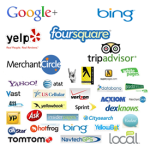 Whether you’re the owner of a small business, an artist or a freelancer, your online presence can make or break you. You want to appear on the first page of a Google search, but not because of a photograph that showcases your poor judgment one night a decade ago. You’ll want potential clients to see that you recently won an award for outstanding achievement, but you won’t want them to see pictures from the after party.
Whether you’re the owner of a small business, an artist or a freelancer, your online presence can make or break you. You want to appear on the first page of a Google search, but not because of a photograph that showcases your poor judgment one night a decade ago. You’ll want potential clients to see that you recently won an award for outstanding achievement, but you won’t want them to see pictures from the after party.
Managing your online reputation can be difficult, since nothing on the Internet ever really goes away. You may need to use an online reputation management service if you’ve made some catastrophic mistakes, but most small business owners and freelancers simply want to get their names out to potential clients. When your reputation is critical to your livelihood, it’s in your best interest to protect your name:
1. Set Up a Google Alert
After choosing a word or phrase, you’ll be notified every time a relevant match appears on the Web. For example, if you put a Google Alert on YYZ Company, you’ll receive an email on either a minute-by-minute, daily or weekly basis about any new Web content pertaining to this company. It is a great way to keep track of your online reputation, though it does nothing to alter it.
2. Buy Your Domain Name
For about $11 a year, you can buy your domain name from GoDaddy.com. Buy your name in several varieties, including JohnSmith.com, JohnSmith.net, JohnSmithblog.com. Even if you’re not planning on setting up a site or blog, this helps build your online presence. When someone searches your name on Google, one of these sites — that you control — is likely to pop up, which helps push down negative content. Plus it prevents others from purchasing and using your domain name in a negative way.
3. Join Social Networks
You may have a Facebook profile for your personal life, but you may not have a page for your professional one. Today the first impression potential clients have of you or your business is made online, according to Reputation.com. Joining Web sites like YouTube, Pinterest, Tumblr and LinkedIn will give you additional help as you strive to establish and control your online persona.
4. Don’t Share Everything
As Anthony Weiner and others have demonstrated, you can very quickly end your career if you’re not careful about what you post online. Weinergate, 2011’s favorite double entendre, shows you just how much damage you can do to your career and reputation if you share more than your should. Here’s a simple question you should ask yourself before you decide to upload something: Will someone seek out another company or freelancer because I decided to post this? If the answer is yes (or even a slightly tipsy maybe), don’t post it.
5. Cleaning Up When You Fail to Follow Tip 4
Anthony Weiner has the millions to hire a PR firm to transform his image, but you probably don’t. Even so, he’s probably never going to win another major election ever again. The fact is that there simply is no way to erase your mistakes; you can only hope to change your image, to distance yourself from these errors in judgment and to make it difficult for people to stumble upon them. If an unflattering photograph on Facebook is causing the damage, you can untag yourself. If it is a poorly worded blog post, you can delete it. Only by making it harder for others to access the troubling content will you be able to move past it.
By Peter Marino – the owner of reelWebDesign.com, a website design and digital marketing company in Westchester NY.
